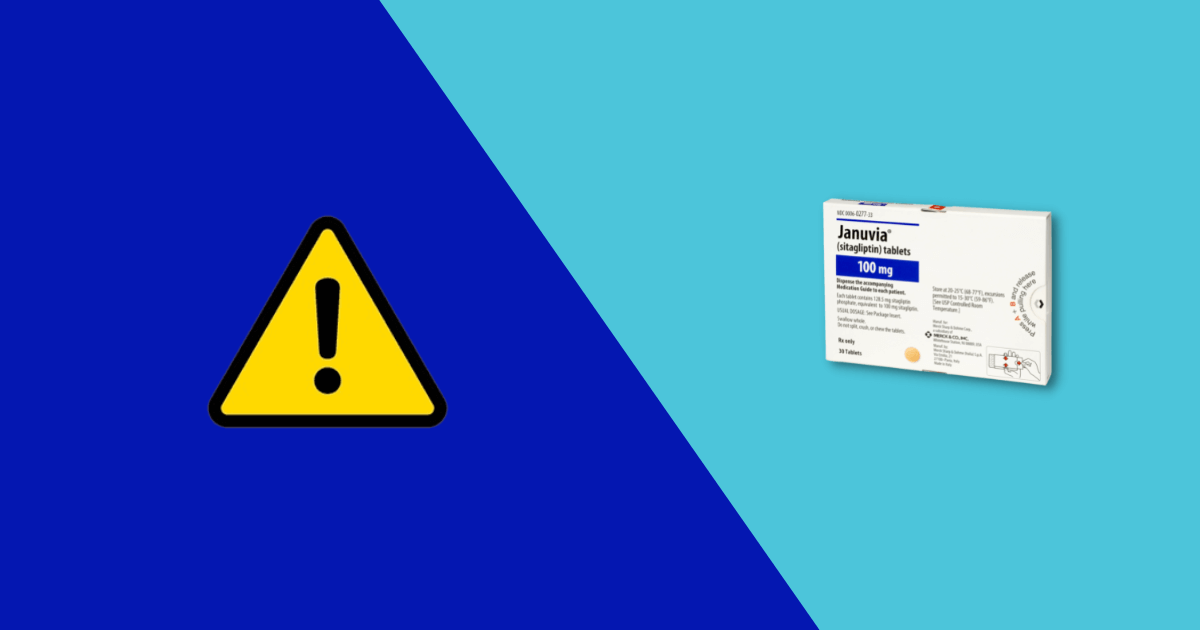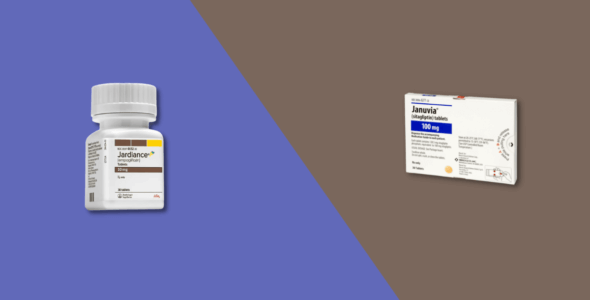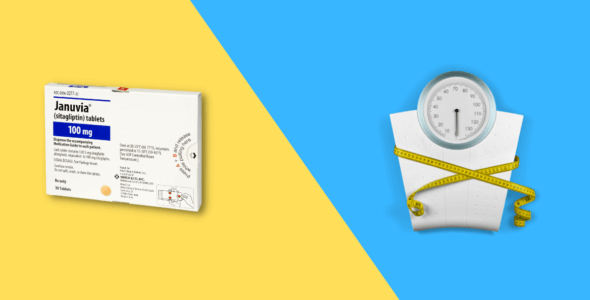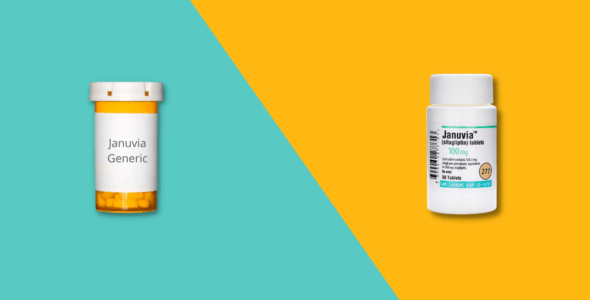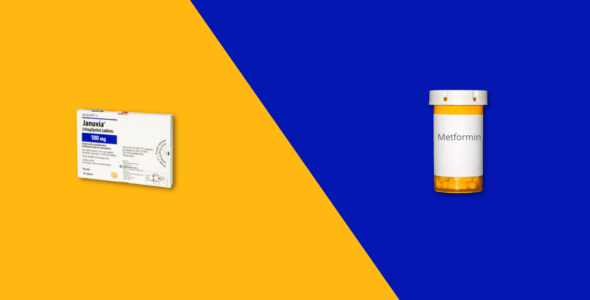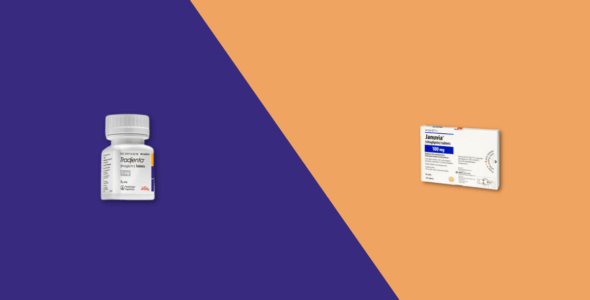Januvia side effects and how to avoid them
Table of contents
- What is Januvia?
- Januvia active ingredients
- Side effects of Januvia
- Severe joint pain
- Heart failure
- Inflammation of the pancreas
- Januvia drug interactions
- Januvia warnings & precautions
- Can Januvia affect pregnancy?
- How to take Januvia?
- Januvia overdose
- What should I avoid while taking Januvia?
- How to avoid Januvia side effects
Januvia is a brand name diabetes drug manufactured by Merck Pharmaceuticals. It is one of many diabetes medicines used to control blood glucose levels in people with type 2 diabetes mellitus. It is often prescribed with other diabetes medications such as metformin.
Januvia can cause adverse reactions as can all medications. The more common side effects of Januvia tend to be upper respiratory tract infections but some patients may develop severe and disabling joint pain. It’s important to talk to your healthcare professional for medical advice about possible side effects that trouble you or are persistent. Learn more about Januvia’s side effects and how to avoid them.
What is Januvia?
Januvia is a prescription medicine approved by the U.S Food and Drug Administration to
- Treat type 2 diabetes, by helping to lower blood sugar levels when used in combination with exercise and changes to your diet
If you have type 2 diabetes, your body may not produce enough insulin or may become resistant to the effects of insulin. This means less sugar is removed from your blood and your blood sugar levels stay too high. High blood sugar levels can cause a range of problems over time, including nerve damage, heart disease, strokes, and kidney failure.
Januvia treats type 2 diabetes by helping to lower your blood sugar levels. It encourages your pancreas to produce insulin for longer after you’ve eaten, helping your body absorb more sugar out of your blood. Januvia can not treat diabetic ketoacidosis or type 1 diabetes.
Januvia active ingredients
The active ingredient in Januvia is called sitagliptin. It works by increasing the amount of insulin you produce after you’ve eaten.
When you digest food, your stomach and gut produce digestive hormones called GLP-1 and GIP. These hormones make your pancreas secrete insulin. As you continue to digest your food, the digestive hormones are broken down by an enzyme called dipeptidyl peptidase-4 (DPP-4) to allow your levels of insulin to fall again.
Sitagliptin stops the DPP-4 enzyme from breaking down the digestive hormones. This keeps the hormones active for longer, making you produce more insulin, and lowering your blood sugar to normal levels.
Side effects of Januvia
The most common side effects of Januvia include:
- Headaches
- A stuffy or runny nose
- A sore throat
- An increase in upper respiratory tract infections, like colds, sinus infections, and the flu
- Constipation
Often these side effects disappear after a few weeks of use. Occasionally, Januvia can cause more serious side effects. These include:
- Severe joint pain
- Heart failure
- Inflammation of the pancreas (pancreatitis) can be fatal in severe cases
- Serious allergic reactions to the medication can cause anaphylaxis – a potentially life-threatening condition where your immune system overreacts, causing hives, swelling in your face, mouth, and throat that causes shortness of breath and trouble breathing
- Kidney problems that can reduce kidney function or require dialysis
- A serious skin rash called bullous pemphigoid that can cause large, fluid-filled blisters
- Skin reactions called Stevens-Johnson Syndrome
- Dangerously low blood sugar levels (hypoglycemia)
Your doctor will assess your risk of side effects versus the benefits of taking Januvia.
If you take Januvia you could experience side effects, including the most serious, but everyone reacts differently to medication. If you have any concerns about side effects, talk to your physician or a pharmacist. You may report side effects to the FDA at 1-800-FDA-1088 or at www.fda.gov/medwatch.
Severe joint pain
Some patients who take DPP-4 inhibitor drugs like Januvia can suffer from severe joint pain starting from day 1 or it may occur many years into treatment. The FDA issued a Drug Safety Communication in 2015 adding warnings for severe joint pain with this class of drug and required drug companies to add this to drug labels. Merck the manufacturers of Januvia advises people who experience joint pain to talk to their doctors about discontinuing the drug.
When the drug was stopped, relief from symptoms was seen by patients but restarted when treatment commenced with the same DPP-4 inhibitor drug or a different DPP-4 inhibitor drug.
Heart failure
Merck added a warning about the risk of heart failure to Januvia in 2017. Januvia has not been linked to heart failure directly but other drugs in the same drug class have.
A U.S. Food and Drug Administration (FDA) safety review found that type 2 diabetes medicines containing saxagliptin and alogliptin may increase the risk of heart failure, particularly in patients who already have heart or kidney disease. The FDA looked at two large clinical studies that showed more patients who took the drugs were admitted to the hospital for heart failure compared to patients who took a placebo.
Patients taking these drugs are advised to contact their doctor immediately if they develop signs of heart failure, symptoms include:
- Shortness of breath
- Weakness
- Trouble breathing
- Weight gain with swelling in the ankles, feet, legs, or stomach
Inflammation of the pancreas
Merck advises patients and healthcare professionals that pancreatitis is a serious side effect of Januvia and can lead to death. Pancreatitis is inflammation of the pancreas, the organ that produces insulin and glucagon. Tell your doctor immediately if you develop severe and persistent pain in your stomach.
Januvia has been associated with sometimes fatal pancreatitis. It’s uncertain if Januvia is a risk in people who have a history of pancreatitis. However, it is advised that all patients taking Januvia are monitored for pancreatitis when they start taking Januvia.
Januvia drug interactions
Certain medications can interact with each other, affecting how they work and making some side effects more likely. Medications that are known or thought to interact with Januvia include:
- Other medications that can lower blood sugar levels such as insulin or a sulfonylurea medicine
- Digoxin which is used to treat a range of heart conditions
Januvia warnings & precautions
Don’t take Januvia if you:
- Are allergic to the active ingredient sitagliptin
- Are allergic to any of the other ingredients in Januvia (listed in the leaflet which comes with the medication)
- Have type 1 diabetes
- Are under 18 years of age
Talk to your doctor before taking Januvia if you:
- Have a history of pancreatitis (inflammation of the pancreas)
- Have gallstones, alcohol dependence, or have very high levels of triglycerides. These medical conditions can increase your risk of getting pancreatitis
- Have a heart condition
- Have kidney disease
- Are breastfeeding or plan to breastfeed, or if you express milk in another way, such as with a breast pump
- Are over 65 years of age
Read the full prescribing information for Januvia and always speak with your healthcare provider for medical advice about your medicine so they can monitor and evaluate your condition. Always inform your healthcare provider of all medical conditions, and medications taken including over-the-counter meds and supplements.
Can Januvia affect pregnancy?
There’s no research on how Januvia can affect your unborn baby. There is a registry that monitors pregnant women taking Januvia, but there isn’t sufficient data yet to judge the drug’s safety during pregnancy.
In animal studies (rats and rabbits), no adverse effects on pregnancy were found, even with high doses of Januvia, but animal studies don’t always predict how a drug will affect human biology. If you’re taking Januvia and fall pregnant, or are trying for a baby, talk to your doctor.
For breastfeeding, there’s no data on whether or not Januvia can pass into breast milk in humans. This was found to be the case in animal studies, so there is a possibility Januvia could pass into your breast milk. Talk to your doctor about taking Januvia if you are breastfeeding or plan to breastfeed, or if you express milk in another way, such as with a breast pump.
How to take Januvia?
Always take your Januvia exactly as directed by the doctor who prescribed it to you. Januvia comes as a tablet that you swallow. You typically take Januvia once a day, at the same time each day. You have to swallow Januvia tablets whole, don’t break or crush them up. You can take Januvia tablets with or without food or water.
What is the best time of day to take Januvia?
There is no recommended best time of the day to take Januvia. Just make sure you take Januvia at the same time each day, at a time convenient to you.
What if I miss a Januvia dose?
Januvia is taken as a pill that’s swallowed, usually once a day in the following doses: 25 mg, 50 mg, and 100 mg. If you miss a Januvia dose, take the dose as soon as you remember. If you don’t remember until it’s time for your next dose, skip the missed dose and don’t take a double dose, as you may take too much Januvia and risk an overdose.
Januvia overdose
If you take too much Januvia, you increase your risk of side effects, including serious side effects.
Symptoms of a Januvia overdose include:
- Chest pain
- A rapid heartbeat
- Feeling shaky and nervous
- Excessive sweating
- Changes in your thinking and reasoning
If you’ve taken too much Januvia, you should seek emergency medical attention.
What should I avoid while taking Januvia?
There are no specific foods or drinks you need to avoid when taking Januvia, although you should make sure you stick to your diabetes diet while taking the medication. You should also be careful about drinking alcohol with Januvia.
Birth control pills can make Januvia less effective. Talk to your doctor about the best forms of contraception for you when taking Januvia.
There are also certain medications you should avoid when taking Januvia, as they can interact with it.
How to avoid Januvia side effects
1. Stick to the recommended dosage
Take your prescribed dose that has been recommended by your healthcare professional once daily at the same time each day with water. Taking your medication consistently will make a big difference in how well Januvia works for you.
Your healthcare provider may adjust your dose of Januvia or your other medications to find the best dosage for your specific needs.
2. Discuss medical history
Discussing your medical history with your healthcare provider is important to help them understand how well Januvia will work for you. Give a complete list of all the prescription drugs, including over-the-counter meds, supplements, and medical conditions you may have. Talking with your doctor will allow them to pick up any drug interactions with Januvia and help manage any possible side effects.
3. Reduce alcohol intake
Although alcohol doesn’t interact directly with Januvia, it can lower your blood sugar and make hypoglycemia (low blood sugar) more likely if you’re taking diabetes medications. Drinking alcohol can also increase your risk of pancreas damage. This is known as pancreatitis and can lead to permanent damage to the pancreas and its ability to manage the production, storage, and release of insulin.
Drink any alcohol in moderation when taking Januvia if your diabetes is well controlled and you have no problems with your pancreas. Avoid alcohol when taking Januvia if your diabetes is not well controlled and/or you have any problems with your pancreas.
If you are planning to drink alcohol and you have diabetes, aim to always stay within the recommended guidelines. This is the safest way to drink alcohol.
4. Pay attention to your body
Paying attention to how your body feels when taking Januvia is important, as uncontrolled blood sugar can be fatal. It is useful to keep a diary log of your blood glucose readings and how you are feeling.
Seek immediate medical attention if you feel your blood sugar levels are uncontrolled. People will have different symptoms of low blood sugar. Headache, drowsiness, weakness, confusion, irritability, hunger, fast heartbeat, and sweating are most common. It is important that you learn which symptoms you usually have so you can treat them quickly.
Talk to your doctor straight away if you start to experience any side effects of Januvia when taking it, or if you feel the medication is not working for you.
5. Store Jardiance correctly
Store the medicine in a closed container at room temperature, away from heat, moisture, and direct light. Do not store it in the bathroom.
Knowing how to store your medication is important to make sure it remains as effective as possible. Using expired or improperly stored medication could result in the medication not working properly and even causing unwanted side effects.
Medically reviewed
A medical professional has reviewed this article.


Jamie Winn, PharmD
Jamie Winn, PharmD
Dr. Jamie Winn received his Doctor of Pharmacy in 2002 from the University of South Carolina College of Pharmacy, Columbia, SC. Jamie is a medical reviewer for NiceRx.

